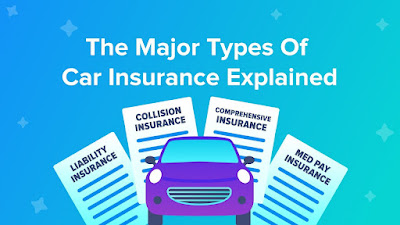There are 6 different types of Car Insurance Coverage
When buying a new car or researching car insurance, it's helpful to know about the different types of coverage typically included in an insurance policy. This allows you to better protect yourself, other passengers and your vehicle in the event of a car accident.
In addition to auto liability coverage, some states require medical payments coverage or Personal Injury Protection. Others allow drivers to choose between these coverages— they are optional. These coverages help drivers pay for different expenses, such as car repairs after a collision or medical bills from an accident caused by an uninsured or underinsured driver. Other coverages include collision coverage and comprehensive coverage.
1. Liability coverage
In most states, drivers are required by law to have minimum liability insurance. This is separate from uninsured motorist insurance, which is also mandatory in most states. Liability insurance consists of two parts:
- If you cause an accident that injures others, personal injury liability may cover costs associated with their injury.
- Damage to other people's property while driving can be covered by property damage liability insurance.
2. Uninsured and underinsured motorist coverage
In some states, uninsured motorist coverage can assist with the costs of repairs to your vehicle or medical bills caused by a car accident. This is helpful in the case that a driver is involved in an accident with no insurance. Alternatively, underinsured motorist coverage can assist in similar scenarios caused by an underinsured driver. This is the case when a driver has insurance but their limits aren't sufficient to cover the cost of any resulting medical bills or vehicle repairs.
Some states require uninsured and underinsured motorist coverage, whereas other states allow it as a choice.
3. Comprehensive coverage
Comprehensive insurance can help cover the cost of repairing or replacing your vehicle in the event
of vandalism, theft, fire or hail. If your vehicle is damaged by an insured accident, you may be
entitled to compensation up to the actual value of the vehicle. There's a deductible, me. H.
You can repair or replace your vehicle for the amount you pay before the insurance company pays
your claim.
In some cases, your lender may require comprehensive insurance when you pay off your
vehicle lease. It is usually an optional cover.
4. Collision coverage
As a courtesy, insurance companies provide collision coverage in case you hit another car or
an object like a fence. This means damaged cars can be repaired or replaced up to the car's
actual cash value— minus the deductible — thanks to collision coverage.
In some cases, your vehicle's leaseholder or lender may require collision coverage as part
of the lease or loan agreement. It is typically an optional add-on.
5. Medical payments coverage
As a courtesy, insurance companies provide collision coverage in case you hit another car or an
object like a fence. This means damaged cars can be repaired or replaced up to the car's
actual cash value— minus the deductible — thanks to collision coverage.
In some cases, your vehicle's leaseholder or lender may require collision coverage as part of
the lease or loan agreement. It is typically an optional add-on.
6. Personal injury protection
Some states offer personal injury protection, or PIP, through their insurance providers.
Like medical payments coverage, PIP can help pay for medical bills after an accident.
It can also cover other costs related to injuries such as child care expenses and lost income.
In some states, Personal injury protection is required while in others it’s optional.








Post a Comment